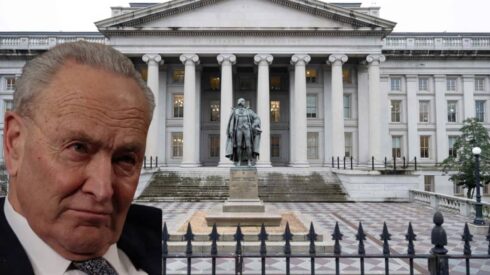Senate Minority Leader Chuck Schumer has announced his support for a Republican-drafted funding bill aimed at preventing a government shutdown, a move that has ignited controversy within the Democratic Party. The bill, which provides a $6 billion boost to military funding while slashing $13 billion from non-defense programs, has already passed the House of Representatives and now requires at least eight Democratic votes in the Senate to clear procedural hurdles.
Schumer framed his decision as a “Hobson’s choice,” arguing that while the Republican bill is flawed, the alternative—a government shutdown—would be far more damaging. He warned that a shutdown would give President Donald Trump and his close adviser, Elon Musk, sweeping authority over federal operations, allowing them to decide which government agencies and employees are deemed essential. Many Democrats, particularly progressives, view Schumer’s position as a capitulation that grants undue control to the Trump administration.
Democratic Infighting Over Schumer’s Stance
Schumer’s decision has divided Senate Democrats, with progressives voicing strong opposition. Congresswoman Alexandria Ocasio-Cortez condemned the move as a “huge slap in the face,” arguing that it undermines Democratic leverage in negotiations. Senator Ruben Gallego of Arizona also announced his opposition, warning that the bill effectively greenlights deep cuts to social programs, including veterans’ benefits and environmental protections.
In contrast, some Senate Democrats have reluctantly aligned with Schumer. Senator John Fetterman of Pennsylvania has expressed support for the bill, citing the severe consequences of a government shutdown. However, many Democrats remain torn, fearing both the financial impact of a shutdown and the political cost of backing a Republican-led funding measure. Progressive activists, including Ezra Levin, co-founder of Indivisible, have urged Democrats to reject what they see as a strategic blunder that hands Trump and Musk unchecked power.
The Republican Bill: Military Gains, Social Cuts
The GOP-sponsored funding bill has drawn sharp criticism for its emphasis on military spending while significantly cutting non-defense programs. The $6 billion increase for the Pentagon contrasts starkly with the $13 billion reduction in domestic spending, which affects programs related to healthcare, education, and environmental protection.
Republicans argue that the bill is necessary for national security and fiscal responsibility. However, Democrats contend that the measure disproportionately harms lower-income Americans by reducing funding for essential services. The bill also includes provisions that strengthen border enforcement and make it harder for Democrats to challenge Trump’s tariffs on Canada, Mexico, and China—key trade policies that have faced bipartisan criticism.
Shutdown Threat Looms as Senate Vote Approaches
With the government set to run out of funding at midnight on Friday, the Senate faces an urgent deadline to pass a spending bill. If the measure fails, the Trump administration will gain full discretion to determine which agencies and programs remain operational. Schumer has warned that this could accelerate cost-cutting measures pushed by Musk’s Department of Government Efficiency, potentially leading to mass furloughs and program eliminations.
Republicans have been quick to blame Democrats for the looming crisis, arguing that rejecting the bill would make them responsible for an unpopular government shutdown. Some conservative lawmakers, such as Senator Rand Paul, oppose the measure from a fiscal hawk perspective, further complicating the bill’s passage. Meanwhile, Democrats find themselves in a precarious position—either support a Republican-drafted bill that undermines their priorities or risk public backlash for triggering a shutdown.
Schumer’s Calculated Gamble and Its Consequences
Schumer’s endorsement of the Republican funding bill represents a high-stakes political gamble. By prioritizing the avoidance of a government shutdown, he has chosen pragmatism over party unity. However, his decision may have long-term consequences for Democratic cohesion, especially as progressives view it as a betrayal of their core values.
If the bill passes with Democratic support, it could set a precedent for future Republican-led spending decisions, potentially eroding Democratic influence over budget negotiations. If it fails, the blame game will intensify, with both parties seeking to pin responsibility for the shutdown on the other. With the Senate vote imminent, Schumer’s leadership is under intense scrutiny, and the outcome could shape the political landscape heading into the next election cycle.














